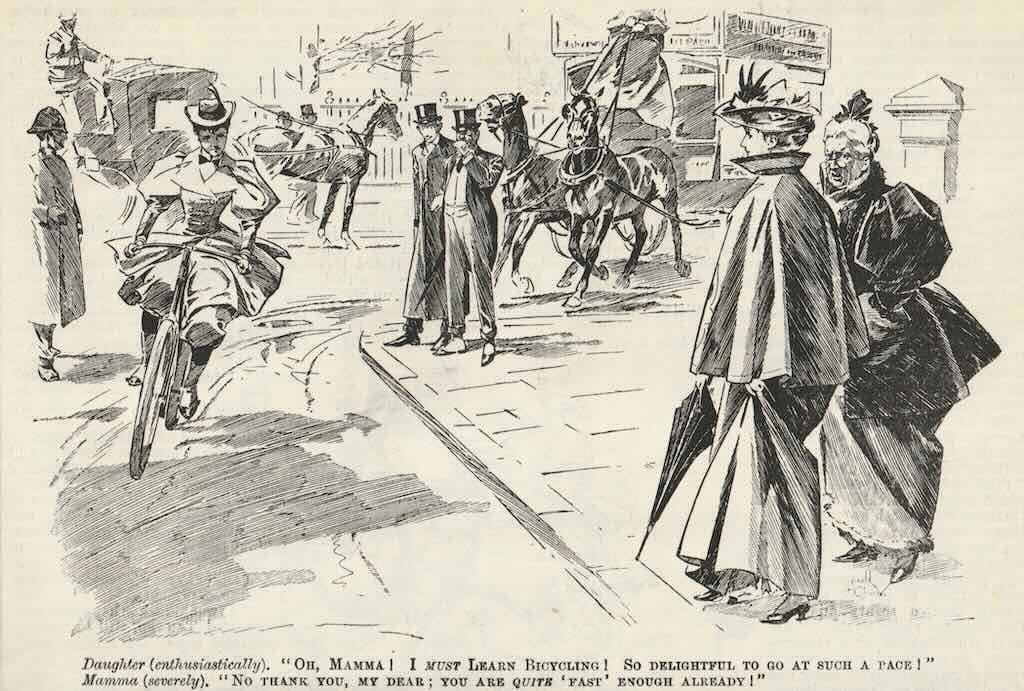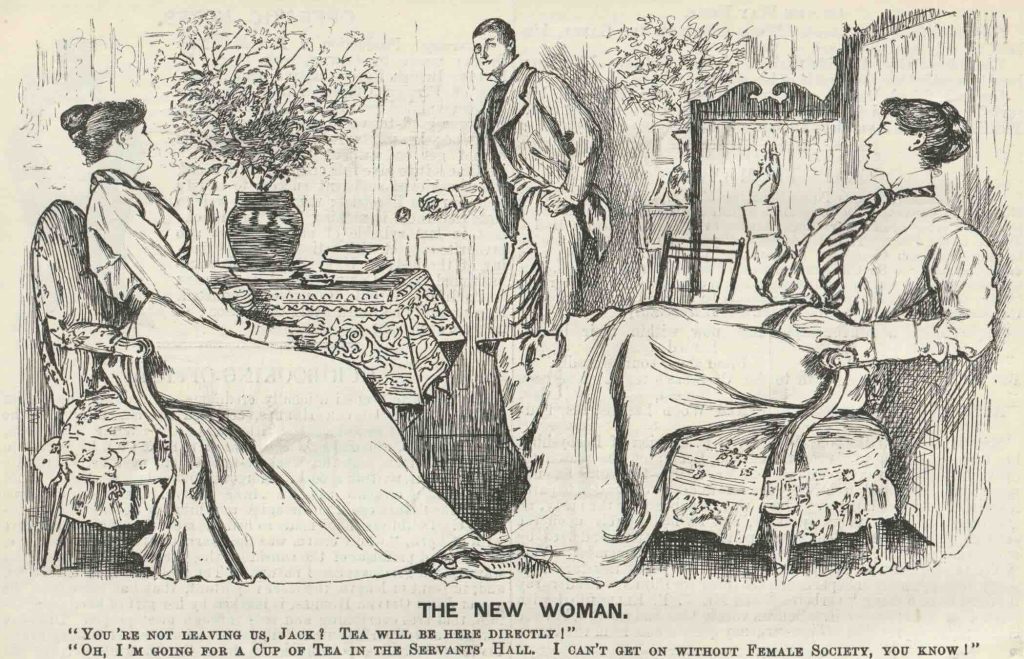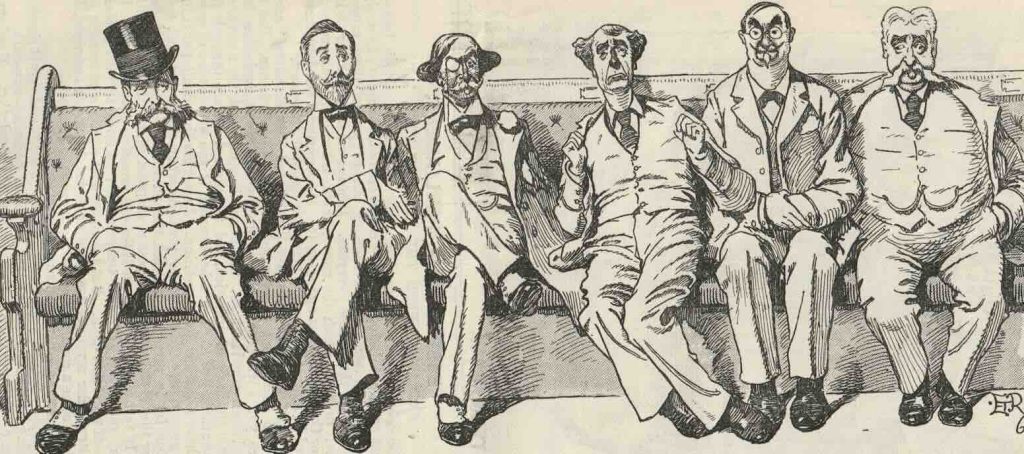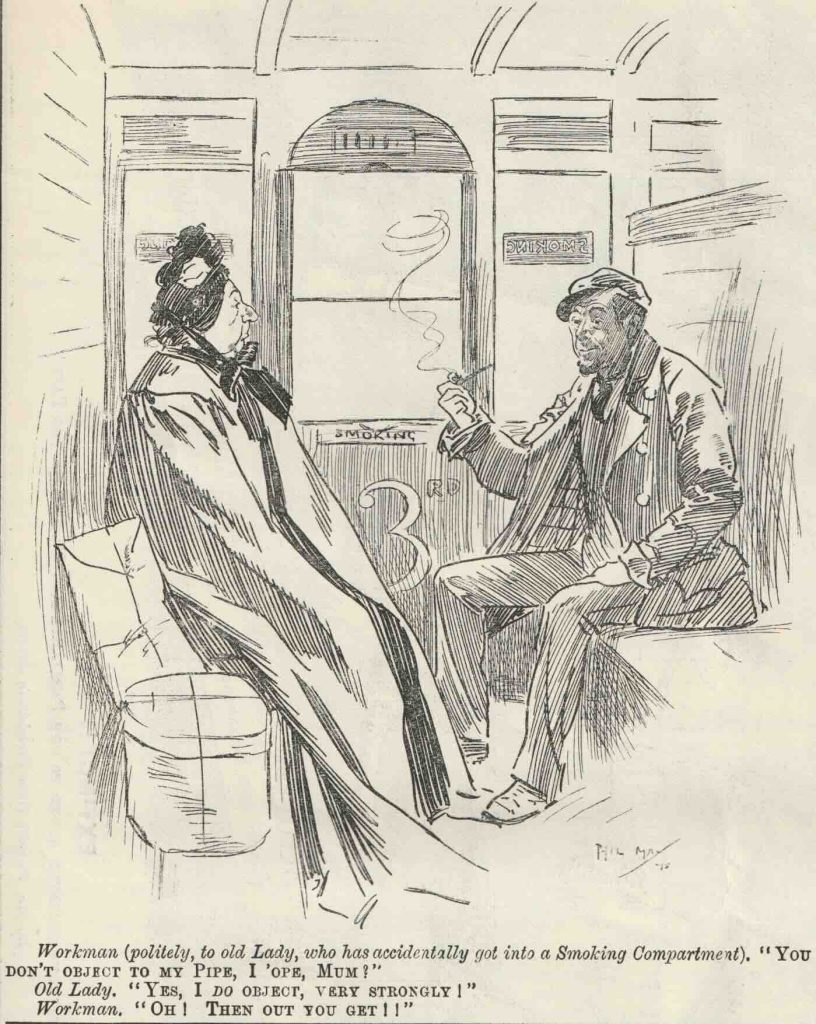I am a man of a liberal persuasion, a man of leisure and taste, and whilst perusing a less than recent copy of Punch Magazine, often called The London Charivari, I discovers some pearls of wisdom.
The year of this Punch was 1895 and the subtitle The London Charivari comes from Charles Philipon‘s French satirical humour magazine Le Charivari. Which refers to the folk practice of holding a charivari, a loud, riotous parade, to shame or punish wrongdoers.
My first impression was that the excess of rhyming stories noted from 1878 had been suppressed, but unfortunately often replaced by exceedingly long texts with insufficient punctuation. Alas I was perhaps a trifle optimistic, for later in the year the penchant for rhyming stores unfortunately returned with a vengeance.
I wondered on the abundance of dialogues in this period, but then realised that the radio had yet to be invented. So I presume written dialogue was a substitute for going to the theatre. Foolish me, I should have realised that earlier. So it’s just one small step to look to set those dialogues to rhyme, but for me it’s one step too far. I shall wait for the Goons.
I was also disappointed that those little comic morsels that lighten the day and excite the tastebuds, were missing. Scraps from Chaps and Roundabout Readings were both unfortunately not able to satisfy my hunger for the absurd. I do find that adding too many words to those little comic morsels, is like adding too many vegetables around a small but delicious piece of meat. Forget the sauce, give me blood – in my comic morsels of course.
I was however positively gobsmacked to read that in 1895 the Chancellor of the Exchequer estimated revenue for the whole year at nearly £94 million. Last year (2022) it was £715 billion. Today £94 million will not even buy you a decent home in central London.
What did 1895 reserve for its unsuspecting victims?
The Treaty of Shimonoseki marked the end of the First Sino-Japanese War.
Alfred Nobel signed his last will and testament, setting aside his estate to establish the Nobel Prize after his death.
Rudolf Diesel patented the Diesel engine in Germany, whilst in Munich, bicyclists had to pass a test and display license plates.
Oscar Wilde was arrested in London for “gross indecency”. French officer Alfred Dreyfus was stripped of his army rank, and sentenced to life imprisonment on Devil’s Island.
Louis Pasteur died.
Extracts made at my will and pleasure

The Age of Love
Sir – Is it possible, in the so-called end of this so-called nineteenth century, to dream of such a thing as the Age of Love? The man of to-day, if he be wise, thinks not of the face and form of the woman he may care to marry, but asks himself the question, “Will she make me a good wife? Can she clean chimneys, cook and mend, is she capable of discussing intellectually subjects of interest, such as dentistry, hunting, symbolism, and so forth, with her husband? Can she grind the organ, play comb, is she active at crossing, sweeping and cradle-rocking, quick at smiling away one’s smiles and frowning away one’s tears, ready to greet all my friends with the same amiability she shows to me, is she prepared for intelligent begging-letter-writing, can she scour, skirt-dance, recite, carve, mangle, and fence?”
Too often he is bound to answer, “No, she cannot, so what good is she?” I do not mean to say that all women are like this. Heaven forbid! But good housewives are few and far between. There are many girls of the period who are deficient in one or even more of the accomplishments above-mentioned, so how can she be fitted for the wife of a middle-class man?
It is all very well to love, but a vastly different matter to marry such women as these. Good sound reason and common-sense are better articles to possess. We cannot have too much of that. Indeed we often get a great deal more than is good for us, so that in my humble opinion friendship, common-sense, logic, and grammar are worth more that all the love any man or woman can give. It is very well to sneer at pessimists, but in my humble opinion they have only themselves to blame for it, and through all ages it will ever be the same until there is some alteration.
I am, Sir, your obedient servant, a sensible pessimist.
Rules of the Ladies Football Club
- OnIy the Association game shall be permitted, with the following modifications.
- Matches shall under no circumstances be played between the months of September and May.
- The sides shall consist of any number of young ladies (not ‘new’), good-looking, and well-dressed, to be captained by a good hostess.
- These are not to run, walk, or scuffle about with, after, or away from, any ball whatever, nor to tumble about under any any pretence, nor to perform any evolution which may be calculated to disarrange their toilet.
- The play shall be conducted by the umpires, who are to be of the male sex.
- There shall be eleven umpires on each side.
- In all cases where possible, the match shall be settled without resorting to brute force, or needless waste of time and breath, by appealing immediately before ” kick-off” to the arbitration of the referee.
- The referee shall be the most intelligent and elderly foreign count whose services are obtainable, or, failing that, the least athletic cabinet minister or archbishop in the neighbourhood.
- The goals shall consist of two large marquees, in which the respective captains, assisted by the other lady-members, shall preside over afternoon tea and ices.
- In the event of the ball travelling anywhere near the goals, or in any way endangering the tea-things, the referee shall at once stop all further play.
- It shall be permissible, and, indeed, recommended, that any, or all, the umpires shall leave the football alone at any stage of the game, and attend to the lady-players, and no umpire shall be ruled “offside” for doing so.
- No cry of “hands” or other invidious comment shall be raised when any umpire is caught asking any lady-player for her hand, or else what would be the blessed good of the club’s existence?
- As many “corners” as possible shall be allowed. These are to be in shady parts of the field or in the marquees, and are to be solely for flirtation.
- A “free kick” shall be given to any umpire who fools about after the ball, when he ought to be in the marquee.
- If there be insufficient space, the game may be omitted entirely, and tea given in the nearest and best-laid-out private gardens, where there are shrubberies and summer-houses, or the match may be converted, in the event of doubtful weather, into a dance.
- No match shall be declared “off” after the banns have been read,
The modern woman

April Foolosophy
Fools rush in where angels fear to tread. Well, this only shows our valiant disregard of danger, our readiness of initiative, our championship of forlorn hopes. We are the elect and proper bell-wethers of mankind.
Where ignorance is bliss, ’tis folly to be wise. Folly is therefore the true wisdom.
Fools build houses, but wise men live in them. Exactly so, we are the architects of this generation. The wise man depends on us for his roof and lodging, and without us, he would be homeless. We have built half of London, and the jerry-builders have done the rest.
A fool and his money are soon parted. A compliment to our open-handed and indiscriminate generosity. It is we who swell the subscription list for the last new gold mine or building society, who subsidise insolvent South American Republics, who support the mendicant tramp and the deserving blackmailer.
There is no fool like an old fool. That is, the quality of folly improves with keeping, like that of wine. The seniors of our class are thoroughly reliable old fools, and Past Grand Masters in the art of ineptitude. We, fools as we are, know how to pay the proper respect that is due to senility and second-childishness.
A fool at forty is a fool indeed. It is only at this age that we attain to the years of full indiscretion. We develop later than the rest of humanity, we undergo a severe probation before our claim to the title of complete nincompoop is recognised. Before forty there is yet a chance that the budding ninny may desert, and degenerate into a prig, a Philistine, or a physician. After that age he is safe, and can be depended upon for unwisdom, whereas that ordinary wiseacre cuts his back teeth and graduates in common-sense at twenty-one.
Your typical backbenchers

The Wedding Present
London – Jones is going to be married. Of course, I must give him something. But what? A biscuit box? Commonplace. Good idea to look for something more interesting and unusual during my holiday. Just off to North Italy. Will keep my eyes open along the way.
Paris – Walk in the Rue de la Paix and Boulevards. Everything labelled “Article Anglais“. Must really get him something made abroad. Give up looking in Paris. Shall find something farther on.
Lucerne – No good to take Swiss wood carving. Can’t carry home a huge sideboard. All the smaller things can be bought in London.
Milan – The very place. There is an exhibition here. Shall probably see something beautiful. Italy, cradle of the arts, and all that sort of thing. Besides, so nice to say to jones, “My dear fellow, here is a little trifle, got it in Milan, you know. It’s modern, but then the Italians are always so artistic”. To exhibition. Why are pictures here! Of course, just suit me. “Hurry to picture allery. Several rooms. Enter eagerly. After a short time, totter feebly out, and ask the official at the door where I can obtain a little brandy. He, evidently alarmed by my horror-stricken face and staggering movements, asks civilly if I am ill. Would I like a chair? Should he fetch a doctor? Thank him, and say it’s nothing serious. I have only been looking for a few Italian modern pictures. Crawl to the refreshment bar, and am revived with cognac. Then inspect the rest of the exhibition. Am the only visitor, which is not surprising, there is nothing to see but bottles! An exhibition of bottles! They are said to be full of wine, but I do not see how that makes them more beautiful. Absurd to buy Jones some bottles, and equally absurd to buy him some Italian wine when he can get good French wine in England. Besides, can’t carry bottles in my Gladstone bag. Therefore, give up Milan.
Venice – The chief manufactures here are lace and glass. Now Jones never wears any lace, except in his boots, and never wears any glass, not even in his eye. So what good would that be to him? See one or two palaces to be sold, But can’t take them home. So give up Venice.
Bologna – More useless local productions! Here they make sausages and soap. Jones is not a starving scarecrow for want of sausages. nor in want of soap. Must therefore give up Bologna. This wedding present begins to weigh me down. At each new place it obtrudes itself between me and all the beautiful things I look at. Must really get something in Florence.
Florence – Great Scott! It’s worse here. A life-size marble statue, or a mosaic table weighing nearly a ton. Have serious thoughts of buying, at a great reduction, an extra large statue, hitherto unsaleable on account of its size, and then telling jones that his wedding presents is waiting for him here, if he will come and fetch it. The dealer asked 2,000 lira. I understand shopping in Italy. Early one morning offer him 50. He at once comes down to 1,000. I go up to 100. Discuss for one hour, haggle for another hour, dispute angrily for a third. Then go off to déjeuner. Closing price, dealer 725, myself 250. Back again after interval for refreshment. Begin quietly. opening prices, dealer 720, myself 251. discussion, haggling, dispute as before. Indignant marching out by me, frantic pursuits by the dealer. Final prices, dealer 403, myself 396. Each of us house and exhausted, refuses to yield another centesimo. So do no buy statue for Jones, and give up Florence, Genoa last chance.
Genoa – Velvet? What’s the good of velvet to Jones? Besides it it is fabulously dear, something lite attar of roses as so much a drop. must give up on Genoa.
London – Back again. Have bought a biscuit box and sent it to jones. Since then have met Jones’s cousin, and Smith, and Jones’s brother-in-law, and Mrs. RobInson, and a few other mutual friends. We disagree in many things, but in one we seem to be unanimous. We have all given him biscuit boxes!
I can remember when there were a couple of non-smoking carriages on a train

Words from another time...
These are not uniquely Victorian word, but words that were very popular in 1895, and far less so now.
Awfully – Something terrible, such as “he will give you an awful thrashing”. But both awfully and terribly could be positive as in “that would be awfully good of you if you could look after my dog while we are away”.
Cad – someone who does not treat other people with courtesy and consideration. Originally a lad or man who waited about on the lookout for chance employment as a messenger, errand-boy…etc. Then, in the early nineteenth century the short form cad was part of Eton and Oxford slang to refer to people who were ‘not one of us’, that is, townspeople in Oxford, or at Eton ‘low fellows’. From being the preserve of the educationally privileged it then passed on to mean “a fellow of low vulgar manners and behaviour”. Also at the origin for calling bicyclists “cads on casters”, when in 1895 cyclist were as dangerous to pedestrians as they are today.
Crave – as in “I crave your advice” or “I crave your pardon”, from craving meaning a strong desire for something.
Damn – as in “God damned” but also in “damned good”. Could also be “I’m damned if I know”, or someone being a “damned fool” of something “damned foolish”, or “the show was damned before it started” meaning condemned.
Fellow – as in “he’s a deuced good fellow” (he’s a devilish good chap). You could have hearty fellow, young fellow, dear fellow, fellow-officer, awkward fellow, idle fellow,… The expression “hail fellow well met” meaning on easy terms and/or superficial friendliness, has a 19th century ring to it, but actually dates from the 1550s.
Homage – as in “I render humble homage to …”, or “Her attire was a splendid homage to the bygone elegance of the Regency era”. Having its origin in the formal acknowledgement of a feudal tenant or vassal to his lord, it became an expression of respect paid or rendered. In English the word gradually separated itself from the original French word.
Jolly – a synonym of “happy” or “joyful”, and “good” is used as an adjective to express approval or satisfaction. You have exclamations of pleasure or satisfaction, as in “jolly good”, or “that’s jolly nice of you”.
Nincompoop – as in “One might think him a certified nincompoop”, or “Only a nincompoop would attempt…”. A corruption of the Latin non compos, generally meaning a fool or trifler, a dotard, or even a hen-pecked husband.
Old Man – it was a fashion amongst the British upper classes to refer to each other as ‘old man’ or ‘old chap’, particularly if they were friends. But a child could call his Dad, “my old man”, as could a wife call her husband “my old man”.
Pater – meaning father (I guess from paternal), and used as “”Pater, in his infinite wisdom, has decreed …”, and “I sought pater’s counsel on the subject”.
Prig – as in “He parades about like a sanctimonious prig”. According to Wikipedia a prig is a person who shows an inordinately zealous approach to matters of form and propriety. Often seen as arrogant, conceited or annoying, as with snob, prude, old maid, snooty, fuddy-duddy,… Some people equate prig with the word Victorian, but interestingly the use of prig has picked up again post 2000.
Purport – as in “he purported to be a specialist” or “the article purports to be an impartial analysis”.
Rapt – as in “She sat in rapt attention”. A tricky word, meaning someone in an attitude of prayer, a rapt devotee of their God. Also someone lost in their dream, but crowds could be rapt, when looking at something totally absorbing.
Stove-pipe – In 1895 it could have meant a pipe between a stove and the chimney flue. But it also meant a very tall hat with a flat crown and narrow brim, traditionally made of silk.
Suffuse – refers to the action of fluid or light spreading over or through something, so could be used in an expression such as “His voice was low and suffused with passion”.
Taciturn – comes from the Latin verb tacere ‘to become silent’. So taciturn means ‘silent/rarely speaking’.
Tankard – a tall beer mug with a handle and a hinged lid. Without the lid they are mugs, and this confirms what I always thought, anyone unhinged must be a mug (and now we know where the expression’ get tanked’ comes from). Interestingly, one report had the glass bottom tankard appearing in about 1895, but there are examples dating well before that period.
Whiff – strong connotation of a smell as in “get a whiff” of something, possibly a perfume, or a conspiracy, or scandal. But things could be “whiffing good” as well.
Yuletide – firstly the Yule log is a specially selected log burnt on a hearth as a winter tradition. ‘Yule‘ is an archaic word that was replaced by ‘Christmas‘ by the 11th century, but in some places ‘Yule’ survived as the normal dialect term.
The Polite Guide to the Civil Service
It does not take very long to make yourself quite at home as Secretary of the Public Squander Department, the office I will suppose you to be filling. You will find everything ready to your hand. All you will have to remember is this – the golden rule of the Service – that what was done last year, should be followed this, and arranged for next. Ministers come and Cabinets may go, but the P.S.D. continues for ever. The policy of the office must never be disturbed. If it has been the custom (say) to put orange-trees in the open spaces under the control of the Department out to bloom in February, under no consideration whatever must the date be changed. It may be advanced (generally in the newspapers when there is nothing more interesting ripe for discussion) that July would be the better month. It may be declared that an orange-tree taken from a hot house and thrust into the uncertain atmosphere of the Metropolis, and indeed the provinces, stands less chance of weathering that climate in the second month of the year than it would in the seventh. That may be very true, but what has been done by the Public Squander Department once should be repeated for ever. If an alteration has to be made it must not be accomplished except “under pressure”. Questions must be asked in the House, returns moved for, and all the rest of it. So long as the alteration can be resisted, it is the duty of every member of the Department to stand shoulder to shoulder to oppose. You will find a case in point in the matter of your own pet grievance the condition of ‘Milestones’. You will recollect (if you have a good memory) that ‘Milestones’ were the steps of the staircase that led you from the hall of Parliament to the comfortable apartments reserved for the special use of the Secretary of the P.S.D.
“I do not think we need bother about those Milestones,” you will say to the Chief Clerk after you have got accustomed to your messengers and have chosen your easiest of easy chairs. “I daresay there are many matters of more pressing importance.”
The courteous official to whom you have made the suggestion will readily acquiesce, and then inform you that a deputation are anxinus to see you upon the subject. And here you will find one of the disadvantages inseparably connected with making a question exclusively your own. The moment you come into power you are expected to do something. It is of course unreasonable, but none the less for that unavoidable.
“I think you had better see them, Sir”, the Chief Clerk will observe. “They know the ropes fairly well, and I do not think we shall get much peace until you have got rid of them. Of course, we have sent them travelling a bit, but they have got back to me at last”.
“Sent them a travelling?” you will query.
“Well, yes. We have referred them to this department, where they have been asked to apply to that. They have been passed on from office to office until they have come back to us. It is the rule of the game. And now I think the time has arrived when you should see them in person”.
Of course, you have nothing to do but to take your subordinate’s advice. It is one of the regulations of the Civil Service that the tail wags the dog. It stands to reason that a man who has grown grey in the Department is more likely to know the business of the bureau better than you who have just joined. So the spokesman of the deputation receives a polite communication informing him that you will be pleased to see him and his friends at such and such date. Of course, you are furnished with the names of the friends in advance, and your private secretary (your right-hand man) makes it his business to post you up in all that is necessary about them. The day arrives, and with it the deputation. If the House is sitting, you can see the Members in your own room. It looks well if you can show your accosters how small a chamber you occupy, and how hard at work you have to be at all hours of the day and night. Failing a meeting in Parliament, you can receive them in the Department itself. In this case contrive, if possible, to see them in official uniform. Chat with them after you have been to a levée, or Cabinet, or something of that sort. It gives you a distinct advantage if you can overawe them with the glories of a well-feathered cocked-hat, and many yards (chiefly on the back of your coat) of gold lace.
You will have, of course, in attendance upon you several heads of departments. These gentlemen will say nothing, but will look wonders. If you are at loss for figures or facts, you will glance at them and make a bold statement. That daring declaration will, of course. be qualified with the announcement that its made “to the best of your belief.” You will turn your face towards the heads and they will receive your mute appeal with sympathetic attention. They will not be comprehensible, but merely convincing.
Chairs will have been set for the members of the deputation. Some of your visitors will be personally known to you, and these you will greet with effusion. Remember that you must be nothing if not genial. Single out for special cordiality the spokesman. Not, of course, one to your parliamentary colleagues who is going to introduce your visitors to you, but the principal member of the deputation. If you have to contradict him in the course of the interview you will have the sympathy of his colleagues, and they will be glad to see one who has the pleasure of your acquaintance (why should he have it more than they?) soundly snubbed. After every one has got comfortably into their places, you will ask if the Press are to be present. If the reply is in the affirmative (as it most probably will be, as all deputations like to see themselves in print), continue your generalities, and say with a good natured laugh, “that you must be on your guard”. If the interview is not be reported, then you require no further guide. You can say or do almost anything in reason. But assuming that the reporters are present (and here it may be observed that, if your private secretary knows his business, the gentlemen of the Press will to some extent be “selected”), you must be more careful.
You will listen to your parliamentary colleague’s speech of introduction and the address of your friend the spokesman with many silent tokens of goodwill. When there is a trace of a compliment you will smile and bow, and if any figures are introduced you will ask to have them repeated, and make a note of them on a piece of paper. It does not matter what kind of paper you use, the piece will subsequently disappear into the basket reserved for valueless documents.
You will ask several questions, and, when the spokesman has completed his harangue, you will look round to see if anyone desires to follow him. If there is any hesitation, commence your reply at once. But if anyone is ready, let him speak. It is far better that the eloquence of the deputation should come out (like the measles) rather than be suppressed. When your visitors have had their turn, then will come yours.
Of course the less you say the better. I do not mean in words. but in purport. If you have time you can chatter for an hour, but that chatter should be absolutely innocuous. Remember not to give yourself away. Mind, you are bound in office by nothing you have uttered out of it. Be genial. Indulge in small jokes. Let them be at your own expense. Complain that you are powerless. Explain that had you your way you would do all sorts of good things, but “that tyrant, the Chancellor of the Exchequer”, interferes. It is not the fault of the Public Squander Department, but the crime of the Treasury. Wind up by assuring the members of the deputation of your personal sympathy, and assure them that you will take “an early opportunity of laying the representations they have made before your colleagues”.
By following these directions you may be sure that you will gain golden opinions. You will be thanked with effusion for your courtesy, and your visitors will retire entirely satisfied with the reception that has been accorded to them.










